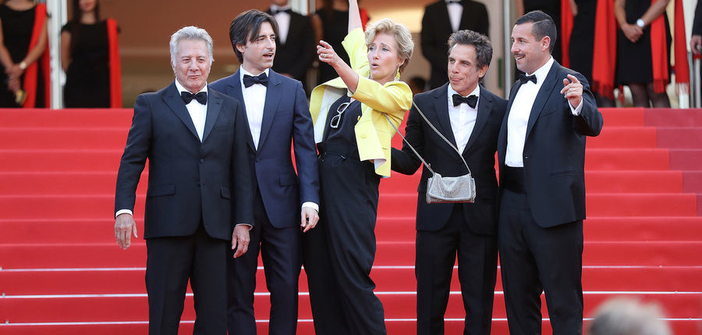Super Sunday at the Festival with two very good films that each introduced us to an egocentric, unbearable, and ultimately endearing artist character. In the American film, it’s a fictional character, the visual artist Harold Meyerowitz; in the French film, it’s a living person, the controversial filmmaker Jean-Luc Godard.
The Meyerowitz Stories, Noah Baumbach (USA)
Harold (magnificently played by Dustin Hoffman) is an outdated visual artist who has health problems. This will be an opportunity for his children, a son and a daughter, as well as their half-brother, to exacerbate conflicts largely created by the relentless selfishness of this father who is loved despite not being loving.
It’s funny, sometimes cruel, but always moving. The emotional bruises of the brothers reminded me of those of a character from Bertrand Tavernier’s A Sunday in the Country, one of my cult films.
However, French audiences will not have the chance to see this beautiful film in theaters because it was financed by the Netflix platform, which wants to keep it exclusive. The festival management, therefore, fell into a trap, and from next year, films of this type will no longer be selectable at Cannes, which is of course logical.
Le Redoutable, Michel Hazanavicius (France)
In 1967, filmmaker Jean-Luc Godard, at the height of his fame, shot a militant film, La Chinoise, with Anne Wiazemsky (the granddaughter of François Mauriac), whom he would marry. But the film was a failure and plunged Godard into an artistic, political, and existential crisis. May ’68 would exacerbate the crisis, and the star director would become a Maoist artist outside the system, as misunderstood as he was incomprehensible. First and foremost for Anne, who would leave him and write the book that Hazanavicius adapted to create this Redoubtable.
This film was immediately somewhat special for us because it was co-produced by Florence Gastaud, a friend who is also a former student. But beyond friendship, it was as satisfied spectators that we left the Grand Lumière Auditorium.
The film is indeed successful, with a very funny Godard in the first part (he hesitates between Antoine Doisnel and Woody Allen), who gradually locks himself in a completely unreal Maoist ghetto where he denies himself as an artist while cutting himself off from his environment. Until he loses Anne.
Le Redoutable is an iconoclastic film that may appear to be accusatory. However, Godard’s stubbornness to drench his glory clothes in the tumultuous waters of the Maoist Revolution ends up moving us.
With this film, following 0SS117, The Artist, and the little-known The Search, Michel Hazanavicius definitively proves that he is, like Jean-Jacques Annaud, one of the most eclectic filmmakers of recent years.
by Patrick Mottard


